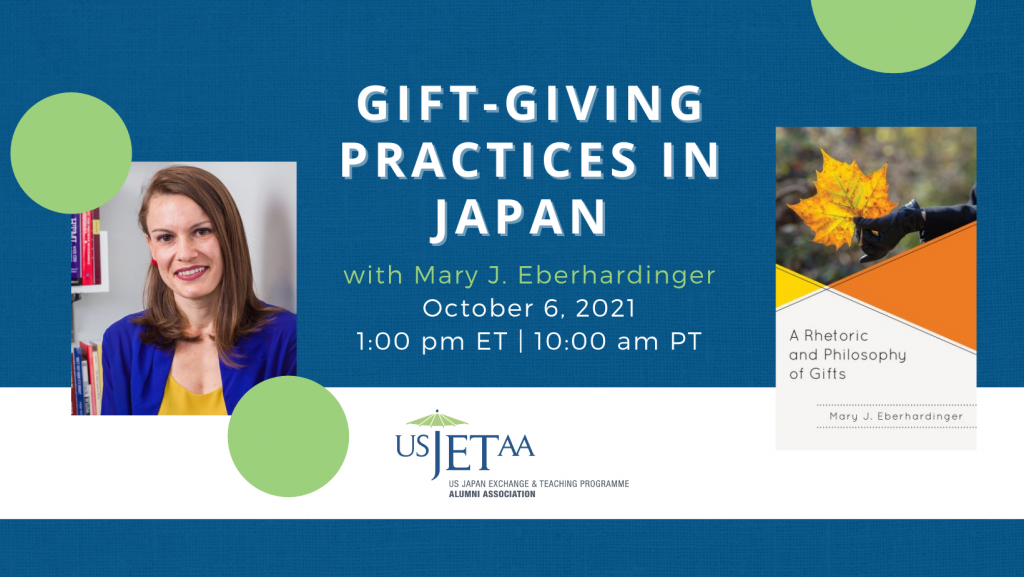
REGISTER
During this lunch seminar, Dr. Mary J. Eberhardinger will briefly present her latest research on gift-giving practices in Japan from her new book followed by an opportunity for questions and discussion on attendees’ personal experiences with gift-giving in Japan. Depending on the number of registrants, this event may use breakout rooms. Dr. Eberhardinger’s book “A Rhetoric and Philosophy of Gifts” examines the relationship between gifts and rhetoric, with particular attention given to Japan where she lived as a JET Program assistant language teacher in Hyogo from 2008-2010. Her book includes a review of related literature, analysis, examples, and personal anecdotes of overseas experiences. Eberhardinger concludes the book by offering implications and opportunities for interpreting gifts, thereby addressing why the question concerning the relationship between gifts and rhetoric matters for the larger landscape of international relations, intercultural friendship, and peace-making. Registrants will receive a discount code for purchasing her book.
Partially supported by funding from the Japan Local Government Center CLAIR and the Japan Foundation Center for Global Partnership.
JET alumna Sarah Coomber (Yamaguchi, 1994-1996) wrote The Same Moon about her adventures after moving to Japan! Sarah will read a short passage from her book and then we will take questions from the audience. You do not need to have read the book to enjoy this event. We hope you’ll join us. Two copies of Sarah’s book will be given away via random draw to those attending live.
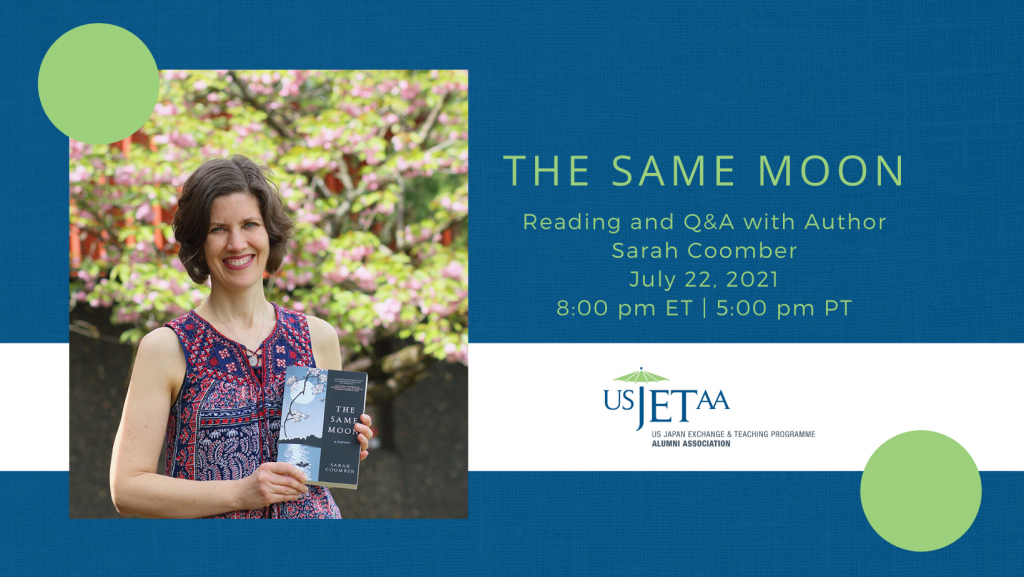
Date: July 22, 2021
Time: 8 PM ET / 5 PM PT
Join: REGISTER
About The Same Moon
Recently wed—and quickly divorced—twenty-four-year-old Sarah Coomber escapes the disappointments of her Minnesota life for a job teaching English in Japan. Her plan is to use the year to reflect, heal and figure out what to do with her wrecked life while enjoying the culture of the country where she had previously spent a life-changing summer that included a romance with a young baseball player.
About the Author
Ever since she turned seventeen, Sarah Coomber has held two homes in her heart: Minnesota, where she grew up, and Yamaguchi, where she spent a summer with the Maeda family, who welcomed her like a third daughter and introduced her to what became an on-again, off-again Japanese life.
That life has included teaching English in Yamaguchi on the Japan Exchange and Teaching Program (1994-96); teaching Japanese language and dance to children at an immersion camp in Minnesota; and studying the koto—Japanese zither—in Yamaguchi and Portland, Oregon, where she achieved her level four Seiha School certification.
Sarah has worked as a public relations professional, reporter, science writer and college English teacher, and her stories and essays on Japan have appeared in the Christian Science Monitor, the Japan Times, the Star Tribune, Cha: An Asian Literary Journal, Memoir Journal, the Font: A Literary Journal for Language Teachers and elsewhere.
She now works as a communications/writing consultant and coach, and teaches Holy Yoga, exploring the nexus of yoga and the Christian faith. She lives … and tries to remember to breathe deeply … with her family in Minnesota. More about here at https://sarahcoomber.com/.
JFNY Literary Series Episode #3
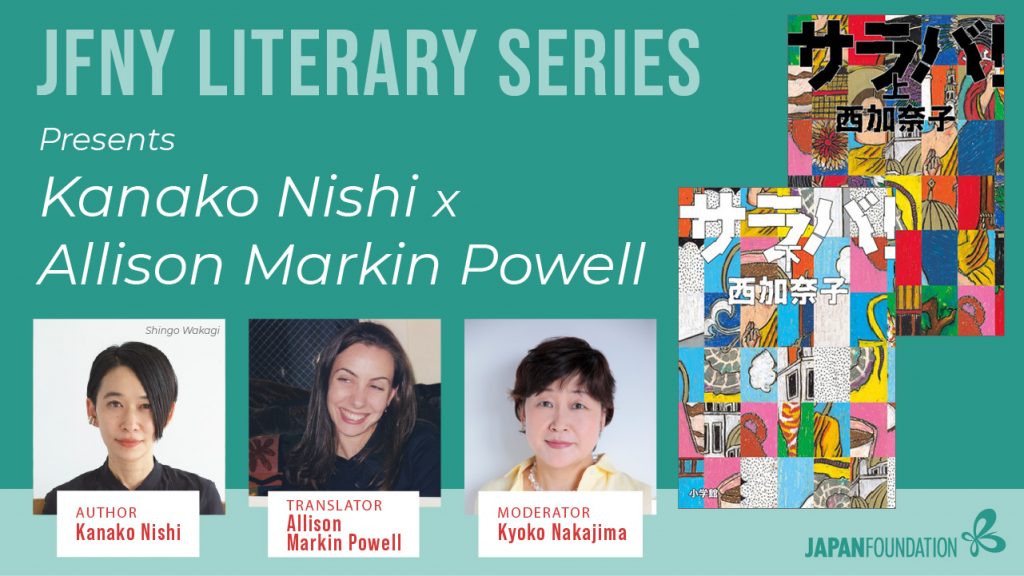
JFNY Literary Series invites notable writers in Japanese literature and their translators to discuss their work, speak on the art of translation, and touch upon the current literary scene in Japan.
This session features Kanako Nishi and her translator Allison Markin Powell, moderated by writer Kyoko Nakajima. Ginny Tapley Takemori from the collective Strong Women, Soft Power and interpreter Bethan Jones also joins the session. Nishi is an award-winning writer who has published more than two dozen books in Japan. Several of her writings are available in English online, all of which were translated by Powell:
In the Age of Endless Scrolling, Jun’ichiro Tanizaki Helps Us Stand Still
On Beauty, Sexual Violence, and Toni Morrison’s The Bluest Eye
The event is now available to watch on our YouTube channel! Watch the event here:
Posted by: Doug Tassin (Fukushima-Ken ALT, 2007-2010 & Krewe of Japan Podcast Co-Host)
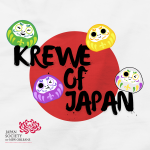
This week on the Krewe of Japan Podcast…
Nigel, Doug & special JSNO guest host (and professor of English at Tulane University) Matthew Smith explore the life & legacy of esteemed journalist/author/folklorist Lafcadio Hearn, also known as Koizumi Yakumo. Hearn’s interest in the occult took him all over the world, including the cities of New Orleans & Matsue. In fact, his books on Japanese culture, folklore & ghost stories played a pivotal role in introducing Japan to the Western world during the late 19th century. Joined by Hearn’s great-grandson Bon Koizumi & his wife Shoko, the Krewe takes an in-depth look into all things Lafcadio Hearn and his impact on the world then and now.
The Krewe of Japan Podcast is a weekly episodic podcast sponsored by the Japan Society of New Orleans. Check them out every Friday afternoon around noon CST on Apple, Google, Spotify, Amazon, and Stitcher. Want to share your experiences with the Krewe? Or perhaps you have ideas for episodes, feedback, comments, or questions? Let the Krewe know by e-mail at kreweofjapanpodcast@gmail.com or on social media (Twitter: @kreweofjapan, Instagram: @kreweofjapanpodcast, & the Krewe of Japan Youtube Channel). Until next time, enjoy!
Japan Writers Conference seeking presenters for 2021
Posted by Tom Baker (Chiba 1989-91)
The 15th annual Japan Writers Conference will be held in October this year. The organizers are now looking for writers, editors and publishers to give presentations on the art, craft and business of writing. If you are a writer, now is a good time to think about taking part.
The conference is a free event, held in English. It covers publishable writing of all types: poetry, fiction, journalism, memoir, translation and more.
Past presenters have included best-selling thriller author Barry Eisler, Edgar-winning mystery novelist Naomi Hirahara and “Slumdog Millionaire” creator Vikas Swarup. There have also been presentations by many JET writers over the years, including poets Warren Decker and Michael Frazier, novelists Percival Constantine and Benjamin Martin, journalists Elaine Lies and Tom Baker, textbook author Todd Jay Leonard, and writing renaissance woman Suzanne Kamata. This year’s event will be cohosted by JET alum and novelist Charles Kowalski, together with nonfiction writer Joan Bailey.
Here are the official details:
::::::::::::::::::::::::::::::::::::::::::::::::::::::::::::::::
The 2021 Japan Writers Conference will be at Tokai University, Shonan Campus in Hiratsuka, Kanagawa, on Saturday, October 16th and Sunday, October 17th, 2020. Hiratsuka is on Sagami Bay, not far from Odawara. As in the past, the conference will be free and open to all who wish to attend. Please mark your calendars and plan to join in. As the COVID-19 pandemic is still with us, there is a possibility we’ll have to move online again this year, or it may be a hybrid, with some sessions held live, some online.
All published writers, translators, editors, agents and publishers are welcome to submit presentation proposals for the 2021 Japan Writers Conference. The deadline for your proposal is Tuesday, June 1, 2021.
Please send your proposals via this page on the JWC website: http://japanwritersconference.org/submit-proposal/
We especially encourage proposals from new submitters. One of our strengths has been variety, and the best way to foster variety is to have new presenters each year.
When planning your JWC proposal, keep your audience in mind. Your listeners will be writers and others (translators, editors, publishers, and agents) concerned with creating publishable writing. While teaching, literary studies and private self-expression are all worthy activities, they are not the focus of this conference.
Standard conference sessions are fifty minutes long, but if you have something longer in mind, please let us know and we will accommodate if possible.
To submit a proposal for a conference presentation, send the following information, using the form here to submit: http://japanwritersconference.org/submit-proposal/
1. Your name (or names)
2. Title of presentation (20 words or less)
3. Type of presentation (short lecture with Q&A, craft workshop, panel discussion, reading with Q&A, etc.)
4. Genre (Fiction, Poetry, Nonfiction, Translation, Instructional, Career)
5. Short summary (50 words or less)
6. Abstract (150 words or less)
7. Personal and professional biography (50 words or less. Mention your publications, as this will be part of the Conference program)
8. Your publications (Need not be complete, but give names of journals and genre for short pieces; title, publisher and date for books; venues and dates for plays, and so on)
9. Are you available on both days?
10. Any special needs?
11. Contact information (email address, telephone number) These remain confidential. Please include everyone who will be part of the presentation.
If you are unable to use the website form, or
have questions concerning your idea or the conference in general, you may use this email address: japanwritersconference@gmail.com
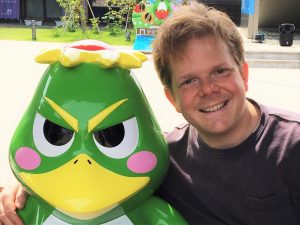
Novelist and JET alum Charles Kowalski will be one of the hosts of the 2021 Japan Writers Conference.
JQ Magazine: Book Review — ‘No Pianos, Pets or Foreigners!: My Life in Japan in the ’80s’
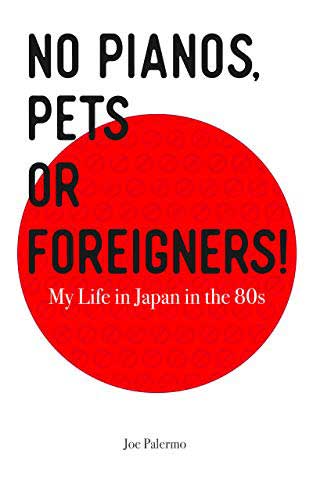
By Rashaad Jorden (Yamagata–ken, 2008-10; Kochi-ken, 2018-2020) for JQ magazine. A former head of JETAA Philadelphia’s Sub–Chapter, Rashaad is a graduate of Leeds Beckett University with a master’s degree in responsible tourism management. For more on his life abroad and enthusiasm for taiko drumming, visit his blog at www.gettingpounded.wordpress.com.
Before the advent of the JET Program, there were Westerners who taught English in Japan. Joe Palermo was one of them, and he tells his story in No Pianos, Pets or Foreigners!: My Life in Japan in the ’80s.
Palermo arrived in Gunma Prefecture in 1982 as a Mombusho English Fellow (a precursor to modern-day JETs) and his book—whose title was inspired by a phrase he often saw in ads while looking for an apartment—is obviously a walk down memory lane, as well as a collection of “what I did in Japan” stories.
The book could best be described as a score of tales best told over a beer or two (like when he realized he left his shoes in a supermarket parking lot during heavy rain). Some of the anecdotes Palermo shares are products of their time, such as his self-introduction to students, “I am E.T.: English Teacher.” Much of No Pianos, Pets or Foreigners contains tidbits that might really only interest Palermo’s close friends (like the appearance of his house). However, the author excels with his observations of life in Japan, such as illuminating things you may not have been aware of or had totally forgotten, like the tendency of Japanese to rarely go to the dentist.
Read MoreJQ Magazine: Book Review — ‘The View from Breast Pocket Mountain’
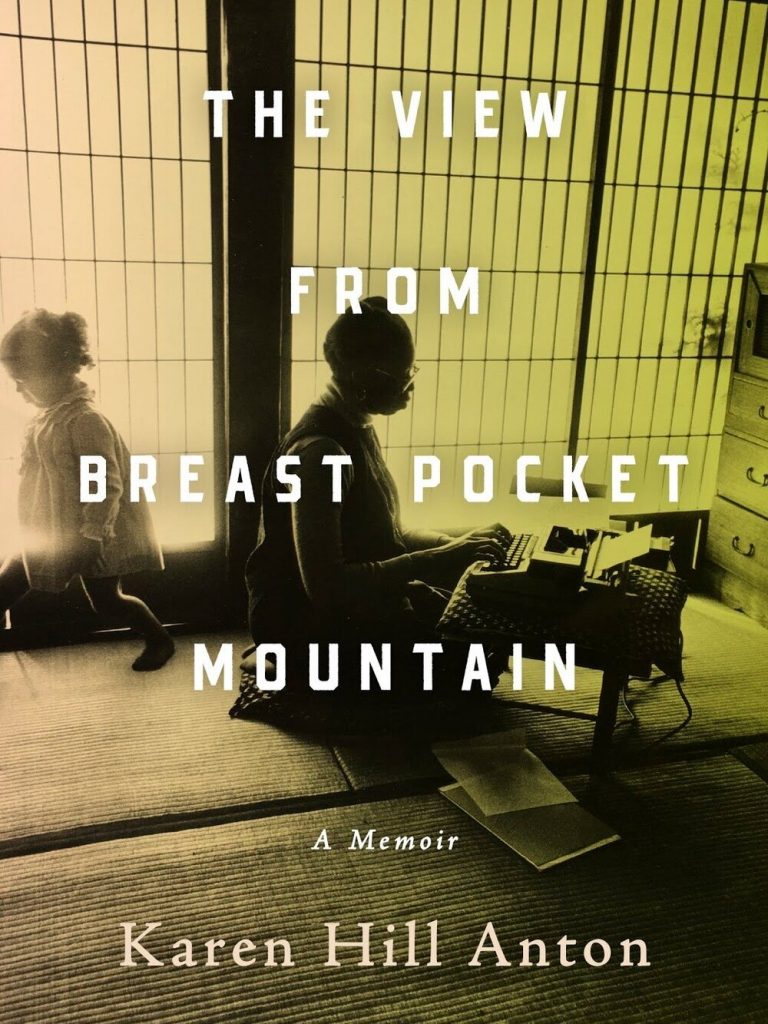
“Finding one’s home is often an experience. If told correctly, its story can be thrilling. The View from Breast Pocket Mountain will captivate those eager to learn more about gaikokujin who have made a home in Japan.” (Senyume Press)
By Rashaad Jorden (Yamagata-ken, 2008-10; Kochi-ken, 2018-2020) for JQ magazine. A former head of JETAA Philadelphia’s Sub-Chapter, Rashaad is a graduate of Leeds Beckett University with a master’s degree in responsible tourism management. For more on his life abroad and enthusiasm for taiko drumming, visit his blog at www.gettingpounded.wordpress.com.
There are gaikokujin whose journey to Japan is quite an adventure. One of them is Karen Hill Anton. She takes readers on a tour of her unconventional life in The View from Breast Pocket Mountain: A Memoir (the mountain is the translated name of the area home of her and her husband’s farmhouse). This is a life that sees her become a columnist for two Japanese newspapers as part of a 45-year (and counting) history with her adoptive country.
Anton’s story starts in New York City, where she grew up in a tenement apartment. The author spends most of the early chapters telling stories of life in the city. Her father often struggled to find work (but did so occasionally as a presser) while her mother was institutionalized. View really takes off when Anton details the period when she traveled outside the United States for the first time. Her adventures took her around Europe (often getting around the Old Continent by sticking her thumb out), where she hung out with a cast of colorful characters, including Swedish painter and textile artist Moki Karlsson, the mother of Swedish music star Neneh Cherry.
The European portion of the book includes more than anecdotes involving interesting figures she met. Anton adroitly captures the vibe of not just a bygone era, but apparently a different planet from the United States—writing that it’s “common sense” in Denmark (where she gave birth to her first child) to put babies outside. You get the sense that she’s completely in tune with her surroundings there as she includes other fascinating tidbits about the Scandinavian country. Through her writing, she comes across as someone who can feel at home almost anywhere.
Read MoreJQ Magazine: Nippon in New York — Home (Media) for the Holidays
By JQ magazine editor Justin Tedaldi (CIR Kobe-shi, 2001-02). Justin has written about Japanese arts and entertainment for JETAA since 2005. For more of his articles, click here.
As fall turns to winter, some spiffed up favorites, holiday hits and new discoveries are coming your way to close out the year.
This season’s highlights include:
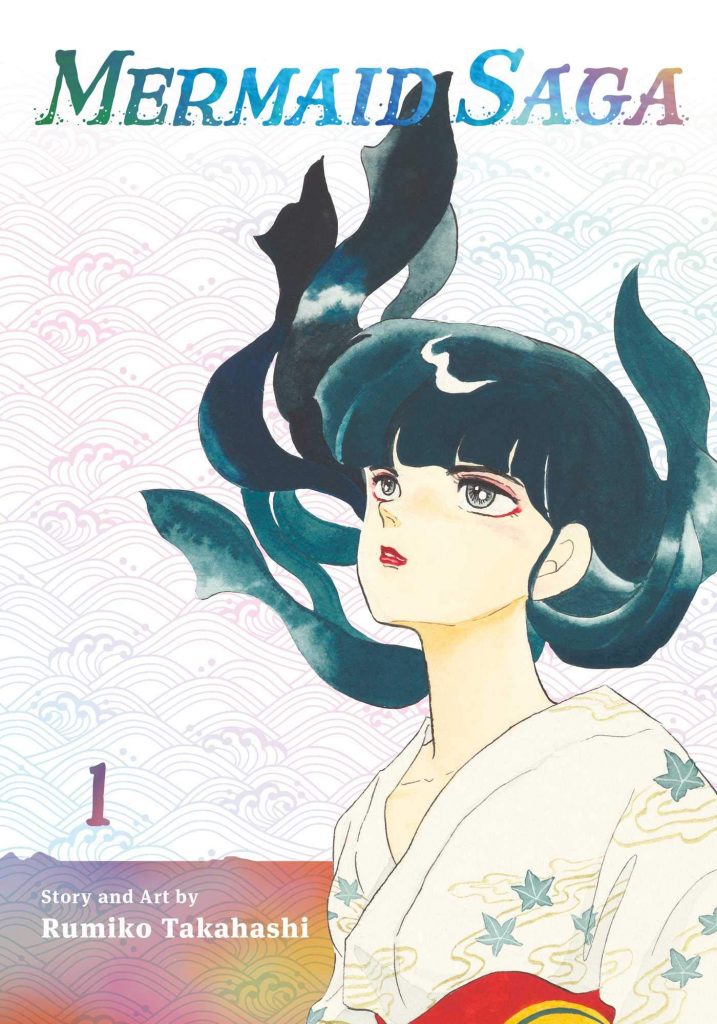
Available Nov. 17
Mermaid Saga Collector’s Edition, Vol. 1
392 pp, $24.99
From Will Eisner Comic Awards Hall of Fame inductee Rumiko Takahashi, the legendary creator of Ranma 1/2 and Inuyasha! Yuta became immortal when he unwittingly ate mermaid flesh, and now he seeks a way to become human again. Hundreds of years later, he encounters a volatile and determined young lady named Mana while searching for a mermaid. Could this mysterious woman hold the key to saving Yuta’s humanity?
Read MoreJQ Magazine: Book Review — ‘The Japanese Sake Bible’
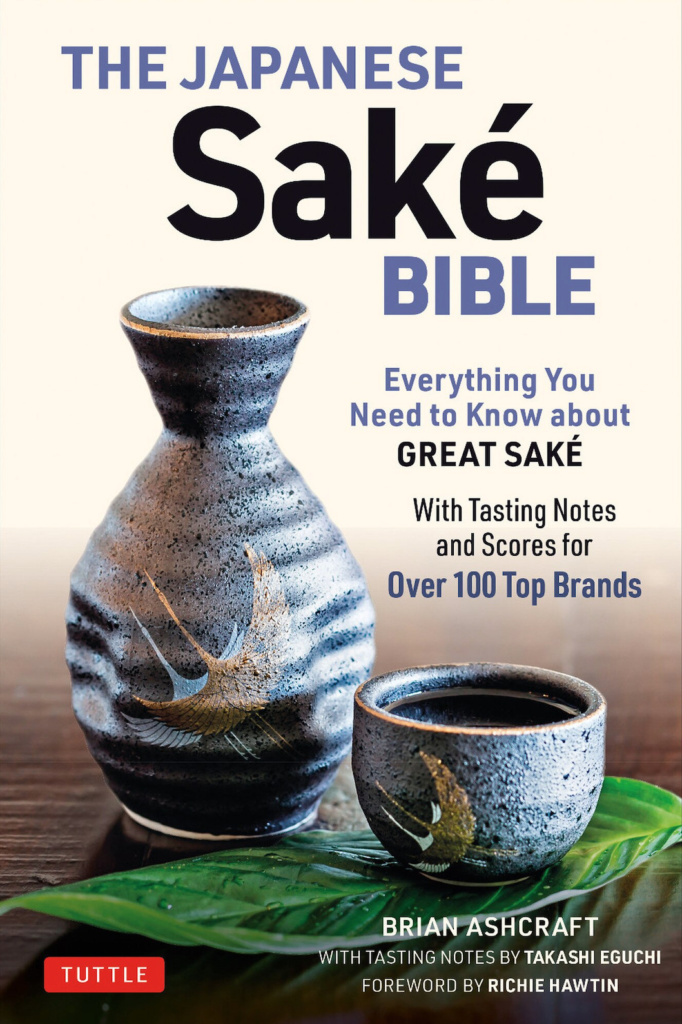
By Rashaad Jorden (Yamagata–ken, 2008-10; Kochi-ken, 2018-2020) for JQ magazine. A former head of JETAA Philadelphia’s Sub–Chapter, Rashaad is a graduate of Leeds Beckett University with a master’s degree in responsible tourism management. For more on his life abroad and enthusiasm for taiko drumming, visit his blog at www.gettingpounded.wordpress.com.
Maybe it’s a bit too strong for your liking. Or maybe it contributed to an unpleasant hangover. But it’s quite possible it was a part of your JET experience.
I’m talking about sake. Anyone curious about what they might have been sipping at an enkai would do well to pick up The Japanese Sake Bible. Compiled by Kotaku Senior Contributing Editor Brian Ashcraft, this comprehensive work examines the world of sake—most notably its origins, its rise to becoming “Japan’s National bBeverage” (coincidentally the title of the first chapter), and tips on how to make the drink yourself.
True to its name, Ashcraft creates a book heavy on history. It’s clear upon looking at the first page of the aforementioned first chapter that this Bible will be more or less Sake 101 (oddly enough, the origins of sake were addressed not at the beginning of the book, but in chapter five). Although the author presents a lot of facts that will probably go over readers’ heads, he excels at thoroughly explaining in detail topics like the definition of sake, which is legally defined as being filtered from fermented rice, koji and water, and the differences between sake, wine and beer.
Although the book is in large part an introduction to the drink, it also serves as a guide for aspiring, if not full-fledged, sake connoisseurs. Ashcraft (also the author of Japanese Whisky) presents to readers more categories of sake than one might have thought actually existed: there’s well-polished sake, sparkling sake, and raw and unprocessed sake. Also, niche sake that might not be easy to find.
Read MoreJQ Magazine: Book Review — ‘Pure Invention’
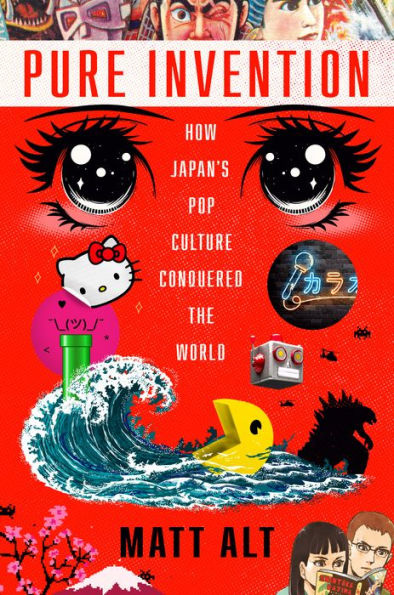
By Rashaad Jorden (Yamagata–ken, 2008-10; Kochi-ken, 2018-2020) for JQ magazine. A former head of JETAA Philadelphia’s Sub–Chapter, Rashaad is a graduate of Leeds Beckett University with a master’s degree in responsible tourism management. For more on his life abroad and enthusiasm for taiko drumming, visit his blog at www.gettingpounded.wordpress.com.
Nintendo, karaoke, Miyazaki, manga, Pokémon. Those names resonate with so many people all over the world as Japanese pop culture, which has become a significant tool in promoting the country. After all, many people feel like they know Japan through what they’ve seen on TV, in the movies, etc. They can also enrich and add joy to our lives.
But how did Japanese pop culture become such a dominant force across the globe? Tokyo-based writer, translator and reporter Matt Alt answers that question and more in Pure Invention: How Japan’s Pop Culture Conquered the World by illuminating brands and names that have seemingly made Japan an epicenter of coolness.
Of course, seemingly everything in Japan has a long history, so why would various forms of pop culture be any different? Unsurprisingly, chapter one of Pure Invention is devoted to the very first manufactured item to emerge from the ashes of World War II, which was a toy jeep. It’s fascinating to read about the backstory of the toy’s creator (Matsuzo Kosuge) and creation, as “jeep” was one of the first English words that Japanese kids mastered in the postwar years. Despite this influence, it is the story of a product that, in Alt’s words, was largely forgotten.
Read MoreJQ Magazine: Book Review — ‘Healing Labor’
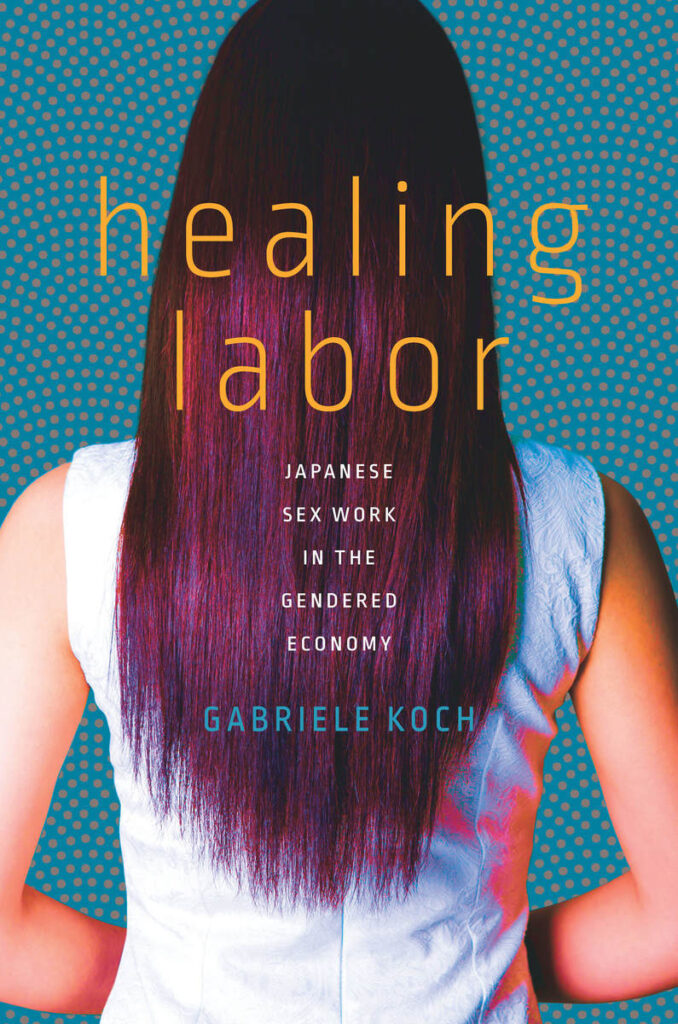
By Rashaad Jorden (Yamagata–ken, 2008-10; Kochi-ken, 2018-2020) for JQ magazine. A former head of JETAA Philadelphia’s Sub–Chapter, Rashaad is a graduate of Leeds Beckett University with a master’s degree in responsible tourism management. For more on his life abroad and enthusiasm for taiko drumming, visit his blog at www.gettingpounded.wordpress.com.
Modern Japan is a huge market for sex.
That statement probably isn’t surprising to those who have spent a night out in certain parts of Tokyo. But this is a reality for people who devote a lot of time to sex work.
Gabriele Koch tackles that statement and more in her examination of Japanese sex workers in Healing Labor: Japanese Sex Work in the Gendered Economy. Koch, an assistant professor of anthropology at Yale-NUS College, conducted 21 months of ethnographic fieldwork in Tokyo from 2008 to 2013 (she also gathered information from additional trips to the metropolis in 2016 and 2017). During her fieldwork, the author explored sites connected to the sex industry as well as diverse groups of people involved in it. Koch would seemingly have had plenty of opportunities to do so: according to research she cited in the book, roughly 22,000 legal sex industry businesses are in operation in Japan.
The information in Healing Labor (a term used to illustrate the view many sex workers have of the reparative aspects of their care since it’s ostensibly vital to any success in the male-gendered economy) is largely qualitative, so Koch doesn’t heavily rely on statistics. But she does use numbers to illustrate the risks for sex workers at Tokyo deriheru (an escort business in which a sex worker is sent to a hotel, rental room or private residence): mainly, in that instance, the relatively low condom use by male patrons.
Read MoreJQ Magazine: Nippon in New York — Fall Reading Roundup
By JQ magazine editor Justin Tedaldi (CIR Kobe–shi, 2001-02). Justin has written about Japanese arts and entertainment for JETAA since 2005. For more of his articles, click here.
With live events still on hold, the weeks ahead are serving up some solid post-summer reading, ready to be enjoyed at home or on the go.
This month’s highlights include:
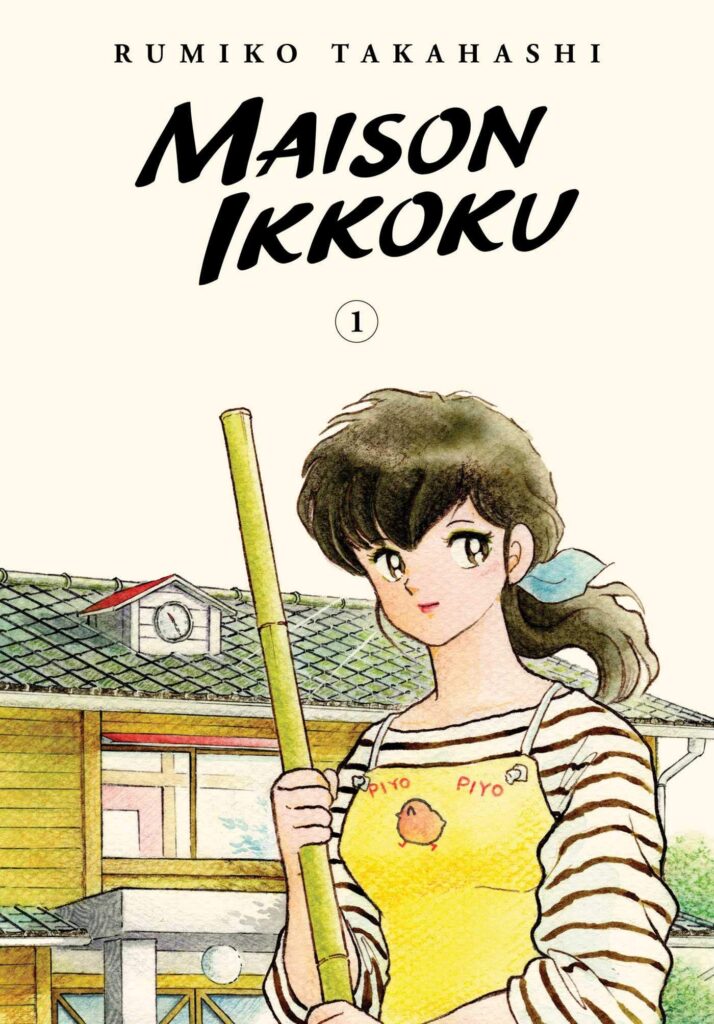
Available Sept. 15
A Rumiko Takahashi Classic Returns
Maison Ikkoku Collector’s Edition, Vol. 1
344 pp, $24.99
For the first time in more than a decade comes a new expanded edition of the fan favorite romantic comedy about finding your path in life from Rumiko Takahashi, the legendary creator of Ranma 1/2 and Inuyasha! Twenty-year-old Yusaku Godai didn’t get accepted into college on the first try, so he’s studying to retake the entrance exams. However, living in a dilapidated building full of eccentric and noisy (to put it mildly) tenants is making it hard for him to achieve his goals. Now that the beautiful Kyoko Otonashi has moved in to become the new resident manager, Godai is driven to distraction!
Read MoreCharles Kowalski to dissect villains at Japan Writers Conference
Posted by Tom Baker
Many JETs are writers before coming to Japan, while others find that Japan give them something to write about. And many JET writers get involved in the Japan Writers Conference, which this year is being held online, Oct. 10-11.
One of this year’s featured writers is novelist and JET alum Charles Kowalski, who will describe how to give your story a compelling villain.
Here’s the official description of Charles’ presentation:

Masterminds, Minions, and Monsters: Creating 3D Villains
(Craft Workshop)
Create compelling villains that readers will love to hate! This workshop will introduce three main villain motivations (the “3 D’s”) and show how these form seven archetypes, plus six effective recruiting tools for henchmen (FLAMES), the top five justifications for villainy, and how to defeat the villain for a satisfying ending.
“A story is only as good as the villain.” – Clive Barker
Bad guys make good stories, and this workshop will focus on creating compelling villains that readers will love to hate.
Here are the questions to be asked and answered in this workshop.
What makes a compelling villain? How can the BOOM technique help create a villain with a believable backstory?
How do the three main motivations of villains intersect to form seven villain archetypes? What are the common personality characteristics of each?
What are the six tools used by master villains to recruit followers? What are the top five justifications for villainy?
What are the five main patterns of villain defeat and their common variations?
Come find out!
Charles Kowalski is the award-winning author of contemporary thrillers MIND VIRUS and THE DEVIL’S SON, and the Japan-themed historical fantasy SIMON GREY AND THE MARCH OF A HUNDRED GHOSTS. When not writing, he teaches at Tokai University.
Panel discussion on MFAs at 2020 Japan Writers Conference
Posted by Tom Baker
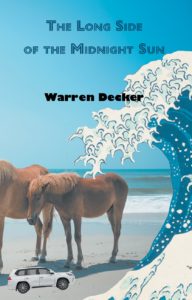
Many JETs are writers before coming to Japan, while others find that Japan give them something to write about. If you’re thinking about furthering your writing career by getting an MFA, then you might want to listen to what JET alums Percival Constantine and Warren Decker have to say about.
The two will be part of a panel discussion at the 14th annual Japan Writers Conference, titled “The MFA: The Good, The Bad, and The Expensive.”
Due to the pandemic, this year’s Japan Writers Conference is being held online, meaning there is no travel involved. Here’s the official description of Percy and Warren’s event:
The MFA: The Good, The Bad, and The Expensive
John Gribble, Kristina Butke, Percival Constantine, Alec McAulay, Warren Decker
Panel Discussion
Should I get an MFA or other graduate-level degree in writing?
Aren’t they expensive? Are they difficult? Are they any good? What sort of program should I look at? What kind of benefits should I expect to receive? These questions and others will be addressed in this session.
Masters of Fine Arts in Creative Writing and other advanced degrees with a writing emphasis have become a viable option for those seeking to improve their writing skills and advance themselves professionally. Some programs are full- or part-time on a university campus, some are on-line, some are hybrids, blending elements of both. The panelists, all with advanced writing degrees, will each talk about the programs they attended, their own experiences and answer your questions.
John Gribble is a noted gasbag. He rarely knows what he is talking about, but he states his ignorant opinions with great vigor. He has spent far too much of his life in school and other institutions. He is also a poet, co-organizer of the Japan Writers Conference and the Tokyo Writers Workshop, and earned his MFA at Warren Wilson College in Asheville, North Carolina.
Kristina Elyse Butke is an American writer, editor, and teacher who indulges in cosplay, art, and all things otaku. She has a BA in English Literature from Capital University and an MFA in Writing Popular Fiction from Seton Hill University. A former college English teacher, playwright, and composer, she now writes fantasy and horror. Her work has been published by ExFic, First Class Literary, and Synaeresis Magazine, among others. She’s also worked the convention circuit, presenting panels on writing fanfiction and genre fiction at events such as Ohayocon, Matsuricon, and Colossalcon. In terms of editing, one of her latest projects included subtitle edits for Pied Piper Inc.’s release of the anime Skip Beat!, and she currently edits and contributes to Speculative Chic.
Kristina lives in Kumamoto prefecture in Japan, where she works in multiple high schools as an assistant language teacher. When she isn’t working on all the things, she travels to shrines, hunts for Kumamon, and spends more money than she should at the JUMP shop.
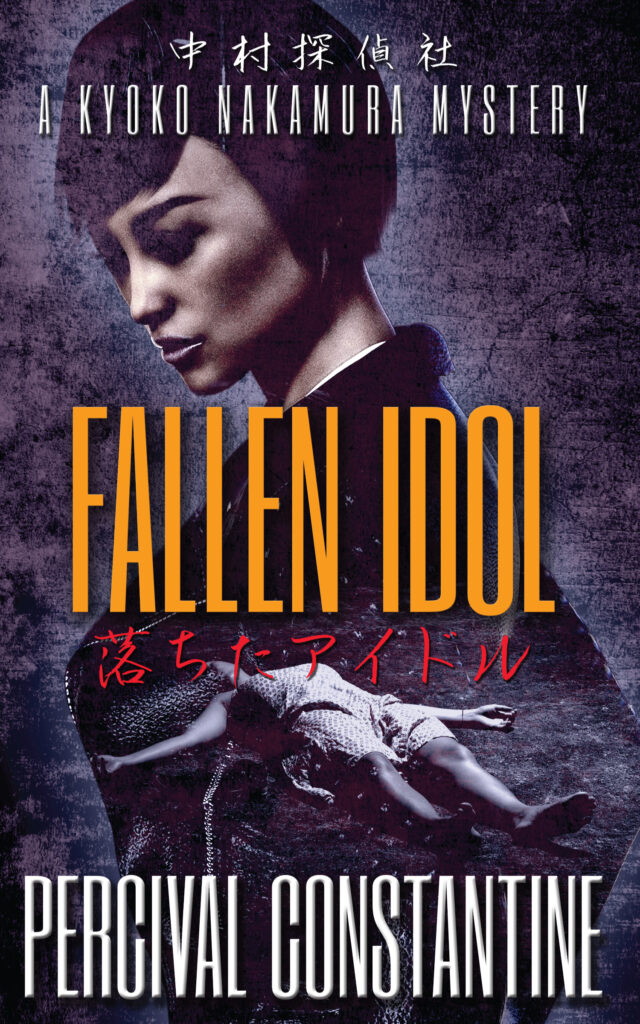
Raised on a consistent diet of superhero comics, action movies, and video games, Percival Constantine wanted to grow up and write the type of fiction he consumed. Now as a prolific author of pulp fiction, he’s written around thirty books across various genres. He’s also the host two podcasts—Japan On Film and Superhero Cinephiles. When he’s not working on projects, he somehow finds time to teach classes in literature, film, and English. Born and raised in Chicago, he’s now based in Kagoshima, Japan.
Alec McAulay is an award-winning writer and director. Originally from Glasgow, Scotland, he has lived in Japan since 1989. He teaches Creative Writing at Yokohama National University. Alec has an MA Screenwriting (Distinction), and a PhD (Screenwriting) from the Faculty of Media & Communication, Bournemouth University. His children’s novel Robot Santa (unpublished) is about a ‘hafu’ Scottish-Japanese girl who builds a robot Santa to save Christmas.
Warren Decker is a teacher and writer based in Izumi, Japan. He has published poetry, fiction, and nonfiction in The Best American Poetry 2018, The New Ohio Review, Modern Haiku, Sou’wester, and other journals. His first book of poetry The Long Side of the Midnight Sun is available from Isobar Press. He has an MFA in creative writing from the online program at the University of Texas, El Paso.
JQ Magazine: Book Review — ‘Issei Baseball’
By Rashaad Jorden (Yamagata-ken, 2008-10; Kochi-ken, 2018-present) for JQ magazine. A former head of JETAA Philadelphia’s Sub-Chapter, Rashaad is a graduate of Leeds Beckett University with a master’s degree in responsible tourism management. For more on his life abroad and enthusiasm for taiko drumming, visit his blog at www.gettingpounded.wordpress.com.
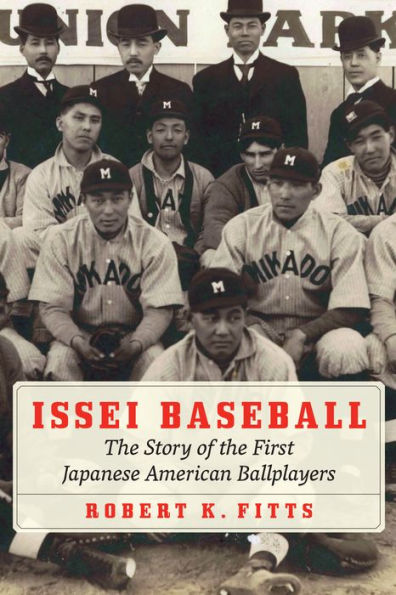
The first professional baseball game involving a team of Japanese players took place in Frankfort, Kansas.
Yes, you read that correctly. That fact—and many other interesting tidbits—appear in Mashi author Robert K. Fitts’ new book Issei Baseball: The Story of the First Japanese American Ballplayers, which chronicles the birth of Japanese American baseball as well as several key figures in its growth. Those figures color the early chapters, as Fitts doesn’t jump right into the tours embarked upon by Japanese American teams.
We’re treated to the stories of pioneers such as Harry Saisho, the creator of a club named the Japanese Base Ball Association (which canvassed the Midwest in 1911), Tozan Masko, the co-founder of the Mikado team (the world’s first Japanese-run professional club), and Isoo Abe, the manager Waseda University’s baseball club and organizer of its U.S. tour in 1905.
Speaking of the famous Tokyo university, Fitts devotes most of the book’s fifth and sixth chapters to that cross-country jaunt.

